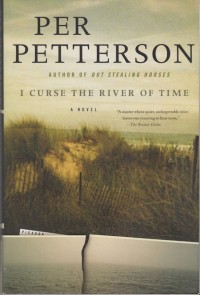I Curse the River of Time by Per Petterson ( 2008. Translated 2010. Picador. ISBN 978-0-312-42953-9)
I got into Petterson’s prose ( I like how that phrase flows off the tongue) due to my pal, Dave Michelson’s insistence that I read Out Stealing Horses, Petterson’s best known novel. I fell for the Nordic vibe of Petterson’s writing style, a style that, in some subtle ways, reminds me of Icelandic legendary author, Harold Laxness. Though Petterson’s work tends to be more limited in terms of scope than say, Laxness’s iconic masterpiece, Independent People, there are similarities between the writers in terms of style and the Nordic poetry their writing evokes.
I Curse the River of Time is, however, to my mind, the least satisfying of the three Petterson novels I have read. This is not to say that the book was troubling, or short changed my expectations, in the same way American author Larry McMurty’s latest effort, When the Light Goes (see review below) did. Unlike McMurty, who, getting on in life, stumbled and fell (in a literary sense) writing When the Light Goes, into the common trap of aging male fiction writers who seem hell-bent to write about the sexual prowess of their male characters in the hope of reclaiming the author’s own youth, Petterson’s fall from literary grace is more subtle. I had particular difficulty sorting through scenes in the book that transitioned from the past to the past-past, as the protagonist related bits and pieces of a life lived as a Norwegian boy, young man, and middle-aged adult, in both Norway and Denmark. Beneath the story lies the contemporary whisper of the protagonist’s impending divorce, a circumstance that compels the first-person narrator to visit his aging mother who is dying of stomach cancer. Trouble is, at an earlier point in the narrative, she apparently also was diagnosed with stomach cancer, when her sons were young, only to find out that the diagnosis was apparently in error. Was the doctor wrong or did the present-day illness, the same illness discussed earlier in the book, simply lie dormant and symptomless for decades? I had a hard time following the time bending narrative of this book.
On the plus side, the language of Petterson’s prose is very poignant and poetic, the sort of rhythmic writing that compels a reader forward even if there is slight confusion in the plot. The scenes between the narrator and a young girl he beds (age appropriately, it seems) and the narrator and his wife as they court are very tastefully done and convey a sense of longing and moral fiber in the narrator that seems to fall off and vanish in later scenes. A lesser work from a strong writer that, in the end, is satisfying enough to recommend as a good read.
4 star out of 4.



